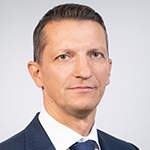What is EU taxonomy? What demands do Articles 8 and 9 of the SFDR make? What are emission scopes? How do you assess positive-incentive or sustainability loans? The vocabulary is ever-expanding: ESG, SRI, ODD, PRI, engagement, exclusion, greenwashing, greenwishing, green bonds, blue bonds – the list goes on, and only a few people know about it, and even fewer understand it.
While the law on financial services will soon require Swiss operators to explain to their clientele the risks involved in sustainability, clients rarely have the necessary expertise to deal with the subject. Consequently, among the objectives that it has set itself as a priority, Union Bancaire Privée’s (UBP) Executive Committee has decided that a good in-house understanding of sustainability and the issues surrounding it is a prerequisite for starting any discussion on and talking about the subject (this is a commitment that has also been taken up by the Association of Swiss Asset and Wealth Management Banks). The task of realising this has fallen to Bernard Schuster, UBP’s Group Head of Communications. Here, we speak to him about achieving this goal.
Why have you rolled out sustainability training for all the Bank’s staff?
We wanted to be certain that everyone understands and that they’re all aware – both as individuals and employees – of the meaning of this approach and of the Bank’s commitments to third parties. Sustainable finance is a new aspect of our profession. We’ve had to gradually integrate regulatory aspects, such as cross-border rules, MiFID and FinSA, along with fiscal issues arising from the automatic exchange of information, and now, we also have to integrate responsible investing by taking social and environmental aspects into consideration.
For front-office teams, explaining that the Bank has committed itself to channelling capital into responsible investments is absolutely essential. Our job is to convince the client to invest in companies that behave responsibly or that have a positive impact on the future. However, you have to be convinced of something yourself before you can convince others.
Who is this training programme aimed at and how is it designed?
The programme is aimed at all the Bank’s staff, regardless of their role. It’s made up of eight 45-minute training modules that are available online in both English and French. It’s an innovative, interactive format accompanied by videos and questionnaires. The training course covers definitions, norms, current and future regulations, what steps UBP is taking and its investor offering. That may sound like a lot, but, overall, it only adds up to a single day of training, it’s just that everyone can take part at their own pace and fit it in with their work schedule.
Is this programme compulsory?
There was a lot of debate about this: should it be compulsory or not? In the end, we decided to make it voluntary, but we stressed how acquiring the necessary expertise will be important for everyone’s job in the coming years, regardless of their role.
And?
The feedback has been very positive: 80% of staff have taken part in the course and 68% of them have completed all eight modules and the programme is still available for those who want take part. Of UBP’s 1,800 members of staff, 1,200 have completed the programme and 300 are on their way to finishing it. Everyone knows that it’s important for the Bank, for their work and for the sector. It has to be said that having made the course available during the Covid crisis has made it much more attractive.
You opted for a tailor-made programme. Why?
We looked at what was already out there, but nothing seemed to correspond to our approach to the subject. We wanted a training programme that was adapted to our vision and our way of talking about it, i.e. positively and calmly. This meant we worked with Blossom to develop a programme tailored to our personality. Navigating your way through the jungle of acronyms, norms and regulations is a challenge faced by every organisation, but to make it interactive and to link it to our objectives and what matters to us was essential. Following this course has been a rewarding exercise for many employees who were unaware of what UBP is doing in this field, with a lot them underestimating the efforts the Bank is making in this field.
How long did it take to develop the programme?
From defining the objectives, writing scripts, generating content and final production, the whole thing took about three months.
Does this course form part of lifelong learning?
Yes. After it was approved by the SAQ, this training programme was added to client managers’ CWMA recertification.
What comes next?
We’ve still got a lot of work to do, as understanding the issues and the ecosystem is one thing, but knowing how to bring up the topic, finding arguments to convince clients or knowing how to respond to objections is another.
According to the SSF’s latest report, almost 70% of inflows into sustainable finance still come from institutional investors rather than private clients. Some of the latter group are still a long way from being convinced about the idea of integrating sustainability into managing their wealth and sometimes there’s not as much appetite you’d expect. The attraction for certain so-called “brown” sectors (in contrast to “green” ones) persists and we have to be in a position to be able to explain to them why tomorrow’s leading companies will be those which have a positive impact, or those that have started a transformation programme. That takes time, notwithstanding the fact that the notion of sustainability does not mean the same thing to everyone and that you have to adjust the discussion according to the standpoint of who you’re talking to and their experience.
To be clear about the context: according to a study published by Standard Chartered, 94% of private investors are concerned about sustainable investments because they don’t know enough about it, and over half of them admit to not understanding the terminology, so we’ve got quite a mountain to climb!
Are younger investors more open to sustainable investing?
Without a doubt, the next generation is more receptive, but it’s still quite traditional as far as their portfolios are concerned. Beyond investment opportunities, the younger generation also attaches importance to companies’ social impact and values, not to mention those of their bank…
Final thoughts?
Sustainability is a constantly evolving theme and developing expertise requires significant investment, both for the Bank and for each member of staff. The course that we’ve put in place is just the starting point of a lifelong learning process.

Bernard Schuster
Group Head of Communications
View his Linkedin profile

